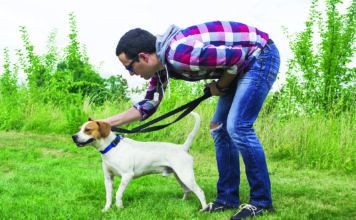Sibling Rivalry Between Dogs
Tufts Animal Behavior Clinic Head Stephanie Borns-Weil, DVM, has always had two dogs in her home since she was 13 years old. Throughout her life she has seen these dogs provide companionship for each other and grieve when their close friend passes on, yet later develop a good relationship with their next sibling.
The Right Way(s) to Teach Basic Commands
You have just brought home a two- to three-month-old puppy and have fallen completely in love, showering him with affection as he gets settled in his new home. Thats great, but you should also start training him within a day or two of his arrival. Youll both be very excited about the new circumstances, and the motivation to bond will be high on both sides. Thats why there couldnt be a better time to start teaching him.
Fido, Can you Get the Light, Please?
Claudia Fugazzas dog Siria would get thirsty after Dr. Fugazza went to bed for the night. So the dog did the logical thing. She turned on the faucet in the bathroom and took a drink from the tap. At first Dr. Fugazza thought she left leaving the water running by accident. But then, to satisfy her hunch, she snuck in on Siria one evening and quietly spied as the dog pressed her nose on the faucet until water came out and she quenched her thirst. Thats what led Dr. Fugazza, a professor of ethology (animal behavior) at Etvs Lornd University in Budapest, to begin her research on dogs social learning - their ability to remember things we do and engage in those same actions later on. In the February issue of Your Dog, we wrote about her proof that dogs can memorize our actions - like touching an umbrella or going over to a traffic cone - up to an hour after their owners had demonstrated the behaviors for them!
Dear Doctor – Grinding away with her teeth
My 18-month-old Catahoula/terrier mix seems to have a need to grind away at hard things with her teeth. I know she swallows small pieces of hard plastic (my solar lights), cement (yard ornaments), terra cotta flower pots - the list goes on. She doesnt seem to be frustrated with her life. She gets two good walks per day, frequent visits to the dog park, and lots of time to run in our fenced-in yard. I supply her with many chew toys, but its the hard stuff she wants. This is a sweet, cooperative dog. Could this be some kind of vitamin deficiency?
They Mouth and Nip and Bite. We Mouth Off in Response. Neither Will...
People have a pretty good sense of touch on their lips and around the face, to be sure. But most of our sense of touch is within our fingers. Its exquisitely acute at the fingertips, in particular. A dog, on the other hand, could never use his paws for, say, reading Braille. The pressure receptors there just wouldnt be sensitive enough to distinguish all those little dots and other shapes; the skin is too thick. The pain and temperature receptors in his paws arent terribly sensitive, either - a good thing for an animal who doesnt wear shoes while walking over gravel and other uneven surfaces.
Ten Signs Your Dog Feels Stressed
Sometimes its easy to tell when your dog feels stressed - during loud fireworks displays, perhaps, or when he doesnt want to get out of the car in the parking lot of the veterinarians office. But there are signs of stress in our canine loved ones that can come across more subtly. What are they, and what can you do to calm your dog during those times that anxiety has gotten the better of him?
Maybe Memory Like an Elephant Should Be Memory Like a Dog
It has long been said that dogs dont sequence memories in their minds the way people do, that in fact they dont really have the kind of awareness of self that would allow them to recall a situation they were in at some point in the past. That is, the belief has been that they essentially live only in the present.
Copy Cats
We have often said in these pages that dogs are very social animals, to the point that they will copy each others behaviors just to copy them. To wit: Franklin never used to shake his whole body out (unless he was wet from rain or snow and I had just put on clean clothes and didnt want to get spattered with water). But then Rosie came to us with the habit. She kind of uses the shake-out as a transition from one activity to another - going from inside the house out to the driveway; going from the woods back to the car; and so on. And now, Franklin shakes, too. He doesnt know why hes doing it. Best I can figure is that he thinks, Shes shaking - I should also.
Tails from the Snipped
Eunice Davis of Norwalk, Connecticut, is concerned about her 8-year-old dog, Shadow. When other dogs come to visit, she says, the first thing he does is try to hump them. She is confused because he is neutered and wonders if its a dominance thing since it doesnt matter if the visiting dog is male or female. How can I change this behavior? she wants to know.
If We Knew What They Were Saying, Their Barking Wouldnt Be So Irritating
In her excellent book, Barking: The Sound of a Language (Dogwise Publishing), Norwegian trainer Turid Rugaas points out that people often think dogs bark as an act of aggression or to prove their dominance, or simply to annoy people. But while barking most certainly can get on peoples nerves, dogs dont bark to strut their stuff or exhibit swagger. Like us, they vocalize to express something - a warning, an emotion, a desire, happiness even.
Getting a Dog Past Submissive Urination
Often its a puppy whos overly insecure around her owners, but it can happen with adult dogs, too. The pet will scrape and bow and prostate herself on the floor to show shes the lowly one and doesnt mean any trouble. Such behavior is problematic in its own right, of course, but what can have consequences beyond emotional ones is submissive urination, say, when you come through the door at the end of the day.
Jollying a Dog Out of Fearful Submission
We have devoted no small amount of space in Your Dog to teaching people how to rein in an aggressive dog, and for good reason. Aggression is the most common behavioral problem we see, and also the most dangerous. One wrong move by an overly aggressive dog, and someone, or some dog, could get hurt — or worse. It doesn't matter whether the aggression is territorial or comes about because a dog is in pain, or even is born of fear. A dog bite (or bites) can be very serious.















